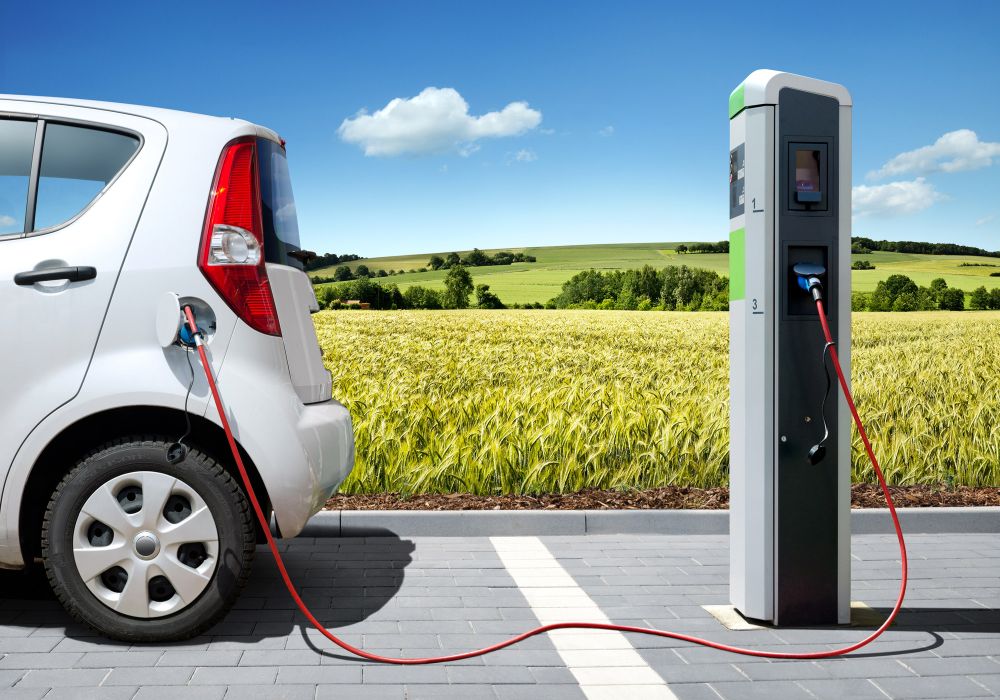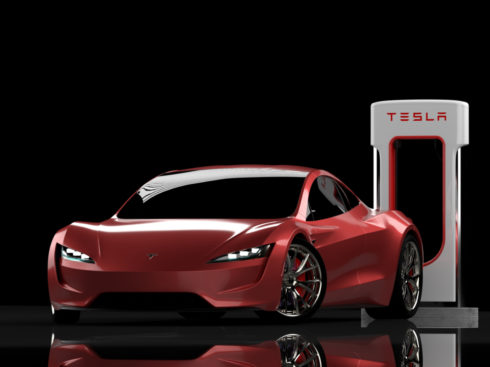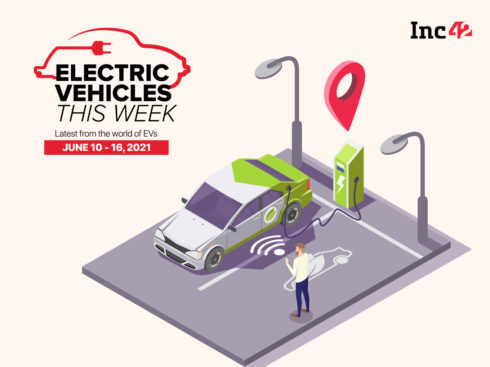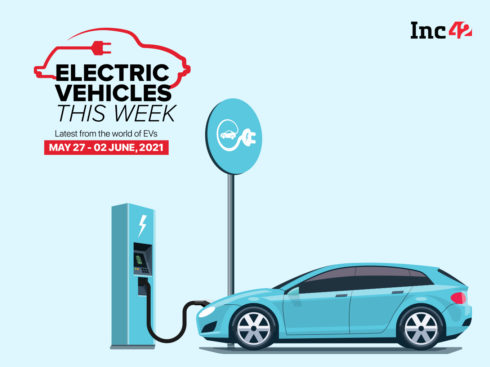
SUMMARY
Important Developments From The World Of Electric Vehicles [11-17 January]
There has been a lot of buzz surrounding electric vehicles over the last week. As more and more companies enter the global EV market, competition is understandably becoming fiercer. To beat rival Tesla, American automotive giant Ford has committed to invest over $11 Bn in electric vehicles, with plans to launch as many as 40 EV models by 2022.
The latest entrant in the electric vehicles segment is Italian sports car manufacturer Ferrari. During a recent media interaction, the company’s CEO Sergio Marchionne announced plans to launch an electric supercar that will give Tesla a run for its money! Japanese automaker Nissan Motor Company, on the other hand, is planning to turn its Infiniti band into a predominantly electric car offering.
Coming to national news, the Indian government’s EV procurement body, EESL, has invited bids for 2,000 electric vehicle chargers as part of the second phase of the tender it floated in September 2017. The state government of Goa has announced that it would be exempting electric vehicles from road, in a bid to hasten the adoption of electric mobility.
Two Indian entities, IOC and Ashok Leyland, have forged partnerships with Israeli company Phinergy to develop electric vehicle solutions. Swedish automotive giant Volvo Cars is preparing to launch a range of electric luxury car models, in an attempt to double its market share in India by 2020.
Given that so much has been happening in the country’s electric vehicle sector, we bring to you the ninth edition of the weekly EV roundups.
Ashok Leyland Partners With Israel Based Phinergy To Develop EV Solutions
During the India-Israel Business Forum this week, Chennai-headquartered Ashok Leyland entered into a partnership with Israeli company Phinergy for electric commercial vehicles. The alliance, as per reports, is aimed at providing a variety of energy management solutions to customers.
A spokesperson for the Hinduja Group-owned company said, “Ashok Leyland and Phinergy will work towards the adaptation of unique, competitive and sustainable solutions for high-energy applications in commercial vehicles.”
Karthick Athmanathan, Ashok Leyland Head EV and eMobility Solutions added, “We see a good potential for Phinergy’s technology in India. This will add further to our various portfolios for commercial EVs, where we are committed to offering our customers competitive solutions with various cutting edge technology.” The company had earlier announced plans to pump $61.5 Mn-$77 Mn (INR 400 Cr-INR 500 Cr) into its electric vehicle business over the next three to five years.
In a related development, state-owned Indian Oil Corporation (IOC) has also inked a pact with Israeli company Phinergy to develop ultra lightweight metal-air batteries for electric vehicles. As per the official statement, the partnership aims to “encourage joint Research and development, deployment and manufacturing activities in the area of metal-air batteries for an array of applications, as stationary energy storage systems, electric mobility solutions etc.”
Govt. Mulls Amending Power Law To Facilitate Establishment Of EV Charging Stations
The Power Ministry is reportedly considering amending the country’s power laws to facilitate faster adoption of electric vehicles. As per reports, the ministry is considering doing away with the restriction on electricity sales by distributors for faster establishment of EV charging stations.
In line with the Indian government’s plans to switch two to 100% EVs by 2030, two committees have been set up to evaluate the policy issues under consideration. At present, the country’s Electricity Act allows only distributors to sell power.
To increase the availability of electricity across India, the government is also mulling allowing other companies known as discoms to sell electricity directly to charging station operators or even create their own franchises of charging stations.
Meanwhile, Gurugram-headquartered power electronics solutions provider Exicom Tele-Systems is set to supply 125 EV chargers to Energy Efficiency Services Ltd (EESL). The company is preparing to install 100 AC charging stations with a capacity of 3.3 kilowatts each. The remaining 25 will be DC chargers boasting a capacity of 15 kilowatts.
EESL Invites Bids For 2,000 EV Chargers For Phase II Of Tender
Government-run Energy Efficiency Services Ltd (EESL), a joint venture of NTPC Limited, Power Finance Corporation, Rural Electrification Corporation, and POWERGRID, has invited bids for 2,000 electric vehicle chargers as part of the second phase of the tender it floated in September 2017. While Phase 1 of the tender involved the procurement of 500 electric vehicles that are to be deployed across Delhi/NCR, the second phase will entail a nationwide rollout of 9,500 EVs later this year.
Commenting on the latest development, Saurabh Kumar, MD of EESL said, “We have invited the bid for 2,000 electric vehicle chargers. We will need more chargers, of course, but we want to do it in phases. Now, we have tested these (chargers) and everything is in place. Therefore we now feel that these specifications can work on the ground.”
At present, Andhra Pradesh, Gujarat and Maharashtra are among the states that have expressed interest in being a part of the second phase. EESL originally invited tenders for up to 10,000 electric vehicles and 4,000 EV charging stations in September last year. The tender was eventually awarded to Tata Motors, while Mahindra said it would match Tata Motors’ lowest bid of $15,534 (INR 10.16 Lakh) per vehicle.
Later in October, the Government of India also invited snap bids for EV chargers, At the time, it was reported that the government was looking to acquire 300 chargers by November 20 for the 500 EVs it procured in Phase 1.
No Road Tax For Electric Vehicles In Goa
Geared towards expediting the adoption of zero-emission vehicles, the state government of Goa has announced that it would be exempting electric vehicles from road tax. A notification issued last week stated, “In exercise of the powers conferred by sub-section (2) of Section 11 of Goa, Daman and Diu Motor Vehicles Tax Act, 1974 (Act 8 of 1974), the government of Goa exempts electric operated vehicles (EOVs) from the payment of tax. The notification shall come into force from the date of its publication in the official gazette.”
This makes Goa one of the few Indian states to exempt electric vehicles from any form of road tax. As of 2017, Goa had around eight to ten EVs registered in the state. Speaking about the move, the state’s Transport Director Nikhil Desai said, “This is an attempt to control pollution by promoting electric vehicles.”
The development comes less than a month after the Society of Indian Automobile Manufacturers (SIAM) urged the Indian government to lower GST on electric vehicles to 5%. As part of its recommendations, SIAM also asked the government to offer one-time income tax deduction of 30% on EVs for non-financed buyers, in a bid to expedite the adoption of electric vehicles.
Volvo Aims To Double Market Share In Indian EV Sector By 2020
Swedish automotive giant Volvo Cars is preparing to launch a range of electric luxury car models, in an attempt to double its market share in India by 2020. Among these is a fully-electric vehicle that will likely be introduced next year.
Confirming the development, Volvo Auto India MD Charles Frump said, “Our game changer would be an array of electrified cars that would be propelled by hybrids, plug-in hybrids and even a full electric which we plan to launch in India soon after its global launch in 2019. We are intending to be leaders in the eluxury space.”
The company, which currently holds a 5% market share in the Indian luxury car market, sold a total of 2,029 units in the country in 2017. The move is part of the company’s long-term goal to sell 1 Mn electric cars globally by 2025.
Volvo had earlier announced plans to only sell hybrid, electric and battery-powered cars in India after 2019. This is in line with the company’s vision to transition to cleaner alternatives to petrol and diesel-based vehicles globally.
SIAM Urges Govt To Extend Custom Duty Concessions On Certain EV Components
Ahead of the upcoming Union Budget 2017-18, the Society of Indian Automobile Manufacturers (SIAM) has reportedly urged the Ministry of Finance to extend custom duty concessions on certain components of electric vehicles that are currently not manufactured indigenously in India.
In order to boost domestic manufacturing of electric vehicles and EV components, SIAM has also asked the Indian government not to offer any custom duty concessions on imported completely built units (CBUs). Further, in its suggestions, it has asked the government to properly distinguish between a completely knocked down (CKD) unit and a semi knocked down (SKD) unit with regards to electric vehicles.
Commenting on the development, a senior SIAM official requesting anonymity said, “We have asked the government to extend certain concessions in custom duty so that certain critical parts or components of an EV which are not yet manufactured in India can be imported at a reasonable rate. Also, we have requested the government not to reduce the custom duty on import of EVs in order to promote local manufacturing of these kinds of vehicles.”
Delhi Govt. Plans To Make 100% Switch To Electric Vehicles By 2038
In light of the rising pollution levels and the ongoing smog, the Delhi government recently announced plans to transition to all electric vehicles within the next 20 years. As stated by Deputy Chief Minister Manish Sisodia, the Government of Delhi is currently working with the Centre to speed up the adoption of electric mobility solutions.
The Delhi government is also reportedly gearing up to launch its first electric bus terminal. Sisodia added, “We will address all administrative issues. Technical issues are beyond us and we need to partner with the industry for that. We have to work together on this.”
Incidentally, according to a report by the Society of Manufacturers of Electric Vehicles (SMEV), sales of electric vehicles in Delhi dropped significantly in FY17. The report stated, “Delhi, which initially used to top this list, now, surprisingly ranks 7th with only 1,072 e-vehicles sold.”
Maruti Suzuki Working With Local Dealers To Develop Lithium-Ion Batteries
Maruti Suzuki is reportedly doubling down on its efforts to move towards an electric car portfolio. According to Maruti Suzuki MD and CEO Kenichi Ayukawa, the automobile company has adopted a multi-pronged approach to make the shift to EVs. For instance, it is currently looking for lithium suppliers for the lithium ion battery plant it is building in Gujarat.
Maruti Suzuki is also in the process of designing a new electric car exclusively for Indian customers. To that end, it is working with dealers to set up charging networks. Ayukawa elaborated, “In a sense, we are trying to challenge ourselves as the time has come to change the game. Hence, we have to review (our strategy) and start again from zero. We need to decide if we want to buy (lithium) from a (Latin) American country or some other country. We need to find a source for that.”
Raising concerns about the high costs and inadequate supply of lithium, he added, “If we cannot get lithium, we cannot make such kind of a product. Lithium ion batteries can be very dangerous—it can lead to fire. Dealers will have to handle a new kind of technology. So we will have to educate the people at the service centres. That will take some time.”
Developments From Around The World
Nissan To Turn Infiniti Into A Predominantly Electric Car Brand
Japanese automaker Nissan Motor Company is planning to turn its Infiniti brand into a predominantly electric car brand. As stated by CEO Hiroto Saikawa recently, all Infiniti models launched in and after 2021 will be either EVs or hybrids.
Speaking at the Automotive News World Congress in Detroit, Saikawa said, “We are going to make Infiniti the premium and highly electrified brand.”
The Japan-headquartered automotive company developed its first battery-powered electric vehicle, Nissan Altra, in 1997. A couple of years later in 2010, Nissan announced the global launch of Nissan LEAF as the first mass-market EV in the world.
As of 2014, the company sold more than 100K units of Nissan LEAF worldwide. Global sales reached 200K by December 2015, making it the best-selling all-electric car at the time. Recently, it was reported that the Renault–Nissan–Mitsubishi Alliance, a Franco-Japanese strategic partnership between automobile manufacturers Renault, Nissan and Mitsubishi, was set to launch a $1 Bn fund for auto tech startup working on electrification, connectivity, artificial intelligence and autonomous vehicles.
Ferrari To Build Electric Supercar To Beat Rival Tesla
Italian sports car manufacturer Ferrari N.V. also seems to have joined the electric vehicle bandwagon, as a way of expanding its market while also thwarting competition from rivals like Tesla. The company has announced plans to build a high-end electric supercar.
Chief Executive Officer Sergio Marchionne said, “If there is an electric supercar to be built, then Ferrari will be the first. People are amazed at what Tesla did with a supercar: I’m not trying to minimise what Elon did but I think it’s doable by all of us.”
Meanwhile, Elon Musk recently announced that after the production of Tesla’s crossover all-electric car Model Y commences in 2019, the US-headquartered company will start working on an electric pickup truck.
Ford Earmarks $11 Bn Investment To Launch 40 EVs By 2022
US-headquartered multinational automaker Ford Motor Company is aiming to launch as many as 40 electric vehicle models by 2020. To that end, the company is looking to significantly increase its planned investments in EVs to over $11 Bn, revealed Chairman Bill Ford recently.
This is substantially larger than the company’s earlier commitment to invest $4.5 Bn in electric vehicles by 2020. As stated by Bill Ford, the investment will go into developing dedicated EV architecture, engineering as well as research and development.
In a recent media interaction, Bill Ford stated, “We’re all in on this and we’re taking our mainstream vehicles, our most iconic vehicles, and we’re electrifying them. If we want to be successful with electrification, we have to do it with vehicles that are already popular.”
Ford’s biggest rival in the American electric vehicles market is Elon Musk-led Tesla. In a related development, as per a recent report by Reuters, global automakers have committed to invest over $90 Bn in electric vehicles till date. Of this, around $19 Bn have been invested by US-based companies, $21 Bn by Chinese carmakers and another $52 Bn in Germany.
With the first phase of EV government tender set to be completed by next week, the Indian government is doubling down to meet its target of switching to 100% electric vehicles by 2030. To be able to attain this feat, however, there has to be a robust network of EV charging stations across the country. Keeping that in mind, EESL has invited bids for 2,000 EV chargers for Phase 2 of the tender. Furthermore, the government is considering amending the country’s Power Act to enhance electricity availability across India.
As an added push, the Indian government is looking to offer incentives and subsidies to domestic battery manufacturers, in order to increase the production and lower the costs of lithium-ion batteries in the country. If successful, the shift to electric vehicles could potentially help India save up to $300 Bn (INR 20 Lakh Cr) in oil imports and nearly 1 gigatonne of carbon dioxide emissions by 2030, as per a recent report by FICCI and Rocky Mountain Institute.
Until then, stay tuned for the next edition of our weekly series of Electric Vehicles Roundup!


























